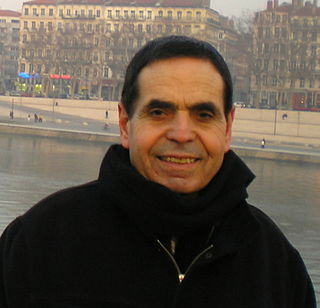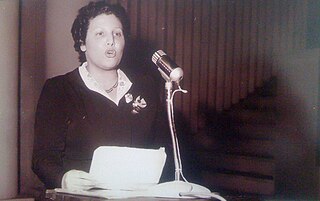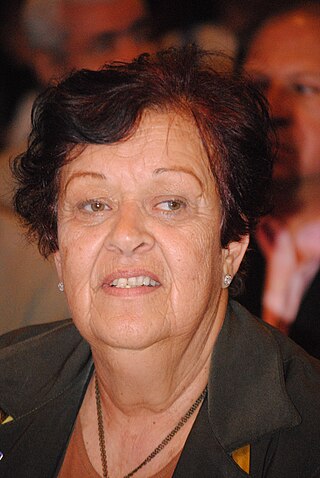Related Research Articles

Tunisia, officially the Republic of Tunisia, is the northernmost country in Africa. It is a part of the Maghreb region of North Africa, bordered by Algeria to the west and southwest, Libya to the southeast, and the Mediterranean Sea to the north and east. It features the archaeological sites of Carthage dating back to the 9th century BC, as well as the Great Mosque of Kairouan. Known for its ancient architecture, souks and blue coasts, it covers 163,610 km2 (63,170 sq mi), and has a population of 12.1 million. It contains the eastern end of the Atlas Mountains and the northern reaches of the Sahara desert; much of its remaining territory is arable land. Its 1,300 km (810 mi) of coastline include the African conjunction of the western and eastern parts of the Mediterranean Basin. Tunisia is home to Africa's northernmost point, Cape Angela. Located on the northeastern coast, Tunis is the capital and largest city in the country. Tunisia is named after Tunis.

Tunis is the capital and largest city of Tunisia. The greater metropolitan area of Tunis, often referred to as "Grand Tunis", has about 2,700,000 inhabitants. As of 2020, it is the third-largest city in the Maghreb region and the eleventh-largest in the Arab world.

Eudora Alice Welty was an American short story writer, novelist and photographer who wrote about the American South. Her novel The Optimist's Daughter won the Pulitzer Prize in 1973. Welty received numerous awards, including the Presidential Medal of Freedom and the Order of the South. She was the first living author to have her works published by the Library of America. Her house in Jackson, Mississippi has been designated as a National Historic Landmark and is open to the public as a house museum.

Ahlam Mosteghanemi, born 13 April 1953, is a notable Algerian writer who is known for being the first Algerian woman to publish fiction in Arabic.
Censorship in Tunisia has been an issue since the country gained independence in 1956. Though considered relatively mild under President Habib Bourguiba (1957–1987), censorship and other forms of repression became common under his successor, President Zine El Abidine Ben Ali. Ben Ali was listed as one of the "10 Worst Enemies of the Press" by the Committee to Protect Journalists starting in 1998. Reporters Without Borders named Ben Ali as a leading "Predator of Press Freedom". However, the Tunisia Monitoring Group reports that the situation with respect to censorship has improved dramatically since the overthrow of Ben Ali in early 2011.

Samar Samir Mezghanni is a Tunisian children's author.

Ahmad ibn Abi Diyaf, known colloquially as Bin Diyaf, was the author of a chronicle of Tunisian history. He was also a long-time and trusted official in the Beylical government of Tunisia. His multi-volume history, while it begins with the 7th-century arrival of the Arabs, devotes the most attention to details of the Husainid dynasty (1705–1957), during the 18th and 19th centuries. His writing is informed by his experience as chancellery secretary during the reigns of five Beys in succession. Bin Diyaf himself eventually favored the reform view, which was current then in Tunisian politics. His letter in reply to questions about Tunisian women has also attracted the interest of scholars of history.

Najiya Thamir, also known as Nejia Thameur and Bint al -Waha, (1926–1988) was a Tunisian writer and radio phonic programs producer.

Ali Douagi or Ali el-Du'aji was a Tunisian literary and cultural icon who is considered to be one of the pioneers of modern Tunisian literature. He is best remembered as "the father of the modern Tunisian short story". Douagi was also known for his versatility as a sketch artist, songwriter, playwright, and journalist.

Amor Ben Salem is a Tunisian Arabic writer.

Sahier al-Qalamawi was a significant literary figure and politician from Egypt who shaped Arabic writing and culture through her writing, feminist activism, and advocacy. She was one of the first women to attend Cairo University and in 1941 became the first Egyptian woman to earn her Master of Arts Degree and PhD for her work in Arabic literature. After graduating, she was employed by the university as their first woman lecturer. Al-Qalamawi was also one of the first women to hold a number of chief positions including chairperson of the Arabic Department at Cairo University, president of the Egyptian Feminist Union, and president of the League of Arab Women University Graduates. Her writings include two volumes of short stories, ten critical studies, and many translations from world literature.Aḥādīth jaddatī was published in 1935.

AÏsha Al-Manoubya, also known by the honorific Al-Saida ('saint') or Lella, is one of the most famous women in Tunisian history and a prominent figure in Islam. She is "one of the few females to have been granted the title of saint."

Nabiha Ben Miled was a pioneering Tunisian women's rights activist and nationalist. She was a leading voice in the press speaking for women's rights and Tunisian independence from French colonialism. She served as president of the Union of Tunisian Women from 1952 to 1963 and wrote articles in favor of Tunisia's independence.

Selma Baccar or Salma Baccar is a Tunisian filmmaker, producer and politician. She is considered the first woman to make a featured length film in Tunis. Baccar is known for creating manifestos through her films, centered around women's rights in Tunisia.

Fatma Chamakh-Haddad or Fatma Haddad-Chamakh was a professor, philosopher, feminist and Tunisian activist.

Sophie Bessis is a Tunisian-born French historian, journalist, researcher, and feminist author. She has written numerous works in French, Spanish, and English on development in the Maghreb and the Arab world, as well as the situation of women denouncing the identity imprisonment to which they are subjected. She is the recipient of the Paris Liège literary prize and was honored as Commandeur of the Order of the Republic.
Amel Mokhtar is a Tunisian journalist and novelist. She has won several prizes, including the COMAR Special Prize in 2006 for her novel Māystrū (Maestro).
Amira Charfeddine is a Tunisian novelist. Her first novel, Wild Fadhīla, was written in Tunisian Arabic and is the first major Tunisian novel to feature a gay protagonist. The novel was commercially successful, selling 2,000 copies within a month of its release in April 2019. It was awarded the Ali Douagi prize from the Derja Association for best work written in Tunisian Arabic in 2019.
Arosyat Al-Naloti is a Tunisian scholar and screenwriter. She was born in 1950 Djerba. She wrote the novel Touch, one of the best 100 Arabic novels.
References
- 1 2 "RIP Hind Azouz … Une pionnière de l'audiovisuel en Tunisie - Tekiano :: TeK'n'Kult" . Retrieved 8 December 2017.
- ↑ Radwa Ashour; Ferial Ghazoul; Hasna Reda-Mekdashi (1 November 2008). Arab Women Writers: A Critical Reference Guide, 1873-1999. American University in Cairo Press. ISBN 978-1-61797-554-7.
- ↑ Kenneth J. Perkins (12 October 2016). Historical Dictionary of Tunisia. Rowman & Littlefield Publishers. pp. 151–. ISBN 978-1-4422-7318-4.